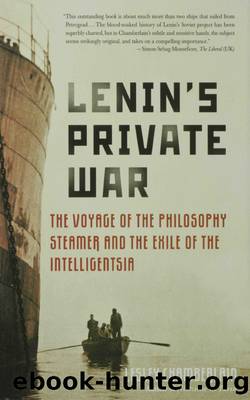Lenin's Private War : The Voyage of the Philosophy Steamer and the Exile of the Intelligentsia (9781429969727) by Chamberlain Lesley

Author:Chamberlain, Lesley
Language: eng
Format: epub
ISBN: 9781429969727
Publisher: Macmillan
But after he resigned he went hungry and by the end of summer 1921 Jakobson was back in the Soviet mission in Prague, part-time, as âa free-lance workerâ until 1928. Nabokov claimed he was a spy.32 This speculation remains unproven, but certainly Jakobson, having been a Kadet in his teens, was in his early twenties pro-Soviet, even though he had had to run from Soviet power.
Fear of secret Soviet infiltration caused the same Russian community in Prague that shunned Jakobson also to turn against Leninâs patent enemy Sorokin. Despite his appointment as Professor of Sociology at the Charles University, Sorokin left in 1923 after only ten months to take up a post at the University of Minnesota.33 Sorokin was not remotely pro-Soviet, but the letter to Pravda in November 1918, in which, sitting in a provincial GPU cell facing a potential bullet, he renounced his will to fight against Bolshevism, counted irrevocably against him. The book Sorokin published in 1923, Sovremennoe sostoyanie Rossii (âThe Current State of Russia), may have been partly an effort to establish a correct perception of his views in the wider world. Only six years after the Russian Revolution he argued that its chief consequence was the degradation of the Russian population.
Feeling the cold wind blowing from Russian Prague, Sorokin spent most of 1923 learning English. From his temporary Cernoýice home, ten miles from Prague, he would pace the open countryside committing long lists of vocabulary to heart. There he was observed by another misplaced man, Dalmat Lutokhin.34
It was even more difficult for thirty-eight-year-old Lutokhin to find a job because almost immediately he arrived he counted as a Communist. The expatriated Russians wanted him neither in Berlin nor in Prague. After giving a talk in Berlin, where he attributed his late arrival to rheumatism, Gorkyâs old friend was marked down as âimpossibleâ by Prokopovich.35 He also didnât make the right political noises when he arrived in Prague in May. Struve and Izgoev took him to breakfast at the favourite haunt of Russians in the Czechoslovak capital, âThe Slav Hotel Beranekâ on Tyl Square in Vinohrady, and came away disappointed.36 One of the few Russians in Prague who would receive Lutokhin, apart from his host Sorokin, was Rozenberg, whom Lutokhin grudgingly called âanother old idealistâ.37 This white crow in the emigrationâ and veteran journalist and publisher declined Lutokhinâs suggestion to report positively on Communist Russia. In Prague Lutokhin sided with Sorokin until Sorokin went to America. After that Sorokin became Lutokhinâs chief ideological enemy.38
A third character marginalized in Prague, the one man adored there by Lutokhin but whom Prokopovich likewise branded a Communist, was Peshekhonov. He was a gifted economist and quite able to head the Economic department at the Institute for the Study of Russia which he and others founded in Prague in April 1924. But the quality of the Instituteâs output paled beside that of Prokopovichâs Economic Bureau and its ideological slant was evident. âThe institute was an SR organizationâ, which might not have been
Download
This site does not store any files on its server. We only index and link to content provided by other sites. Please contact the content providers to delete copyright contents if any and email us, we'll remove relevant links or contents immediately.
| Africa | Americas |
| Arctic & Antarctica | Asia |
| Australia & Oceania | Europe |
| Middle East | Russia |
| United States | World |
| Ancient Civilizations | Military |
| Historical Study & Educational Resources |
The Dawn of Everything by David Graeber & David Wengrow(1698)
The Bomber Mafia by Malcolm Gladwell(1620)
Facing the Mountain by Daniel James Brown(1549)
Submerged Prehistory by Benjamin Jonathan; & Clive Bonsall & Catriona Pickard & Anders Fischer(1452)
Wandering in Strange Lands by Morgan Jerkins(1420)
Tip Top by Bill James(1409)
Driving While Brown: Sheriff Joe Arpaio Versus the Latino Resistance by Terry Greene Sterling & Jude Joffe-Block(1372)
Red Roulette : An Insider's Story of Wealth, Power, Corruption, and Vengeance in Today's China (9781982156176) by Shum Desmond(1356)
Evil Geniuses: The Unmaking of America: A Recent History by Kurt Andersen(1348)
The Way of Fire and Ice: The Living Tradition of Norse Paganism by Ryan Smith(1331)
American Kompromat by Craig Unger(1310)
It Was All a Lie by Stuart Stevens;(1296)
F*cking History by The Captain(1294)
American Dreams by Unknown(1279)
Treasure Islands: Tax Havens and the Men who Stole the World by Nicholas Shaxson(1268)
Evil Geniuses by Kurt Andersen(1252)
White House Inc. by Dan Alexander(1207)
The First Conspiracy by Brad Meltzer & Josh Mensch(1169)
The Fifteen Biggest Lies about the Economy: And Everything Else the Right Doesn't Want You to Know about Taxes, Jobs, and Corporate America by Joshua Holland(1121)
